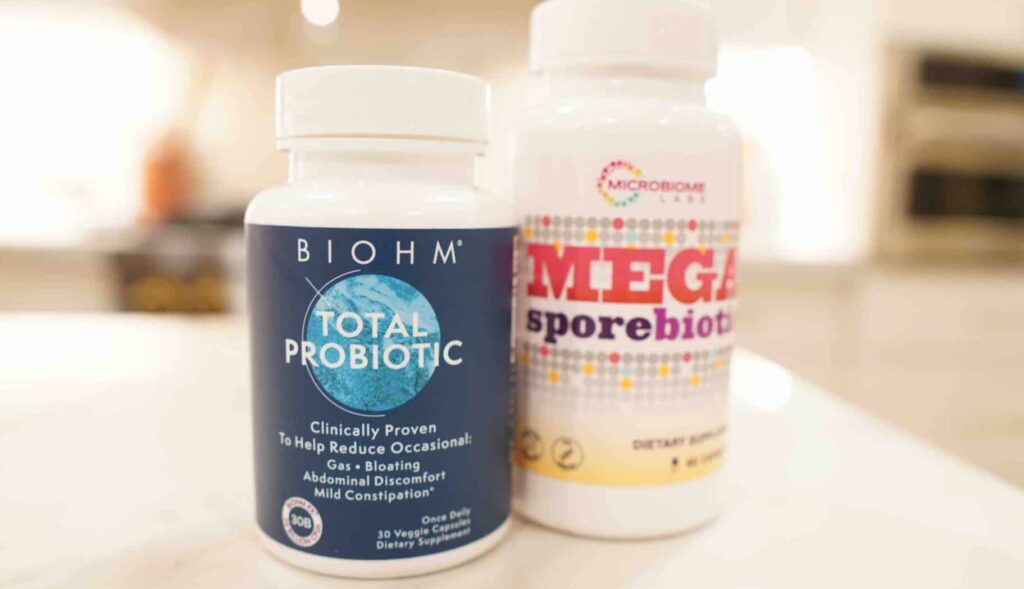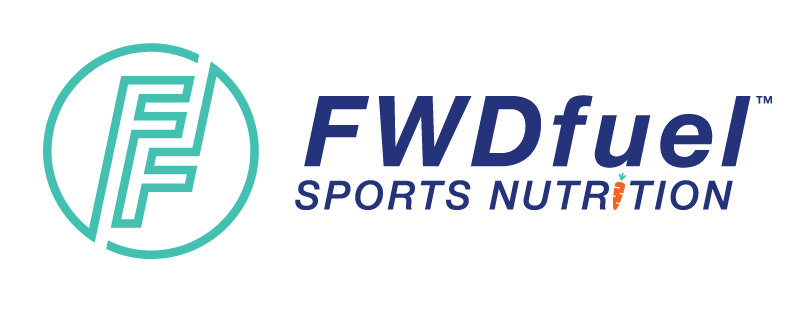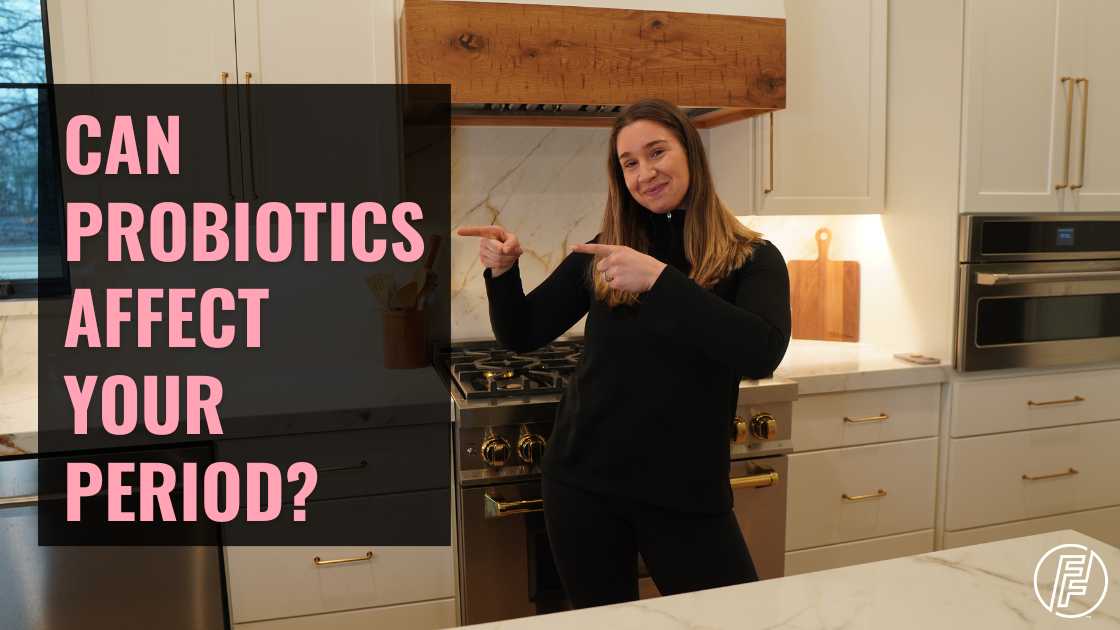Can probiotics affect your period? Are you someone who experiences delayed or scanty periods? Even during a normal menstrual cycle, do you sometimes feel bloated or suffer from loose stools?
You’ll be amazed to know that your gut health has a strong connection with your periods, which is the reason you sometimes have to experience heavy periods, digestive tract issues, or late or no menstrual cycle at all.
But if these uncomfortable symptoms bother you, we can tell you a secret: finding good quality probiotic supplements can contribute to overcoming these problems.
Having thought about this, many people have a question in mind: can probiotics affect your period or its related symptoms?
The short answer is definitely ‘Yes, it does”. It’s clinically proven that many women see positive results.
If you want to know how it works, then delve into the article with us. We are going to tell you some potential reasons behind those debilitating symptoms, irregular cycles, and the proven benefits of probiotics that work. So let’s get started.
Table of contents
1. Your Gut Health is Linked to Sex Hormones
Ever heard of the microbiota-gut hormone axis? If not, then let’s understand the process and make it simple.
Your sex hormone estradiol plays an essential role in your menstrual cycle. Unlike other metabolites, estrogen also needs to get metabolized and excreted through your gut. But it needs a pathway to get excreted.
Your estrogen moves to your liver to get through a few phases of detoxification, and then it reaches the digestive tract, where different beneficial bacteria help fully remove the excess estrogen from the body. This collection of good bacteria present in the gut is referred to as estrobolome.[1]
The estrobolome is a species of bacteria present in the gut that helps eliminate surplus estrogen from the body.
Sometimes, due to an imbalance of gut microbiota, this estrobolome starts to break down the estrogen by releasing an enzyme called beta-glucuronidase. As a result, when it is unable to excrete out of the body, the oestrogen levels increase in the blood.[1]
What Happens When Estrogen Increases in the Body?
When the level of estrogen hormone increases in the body, it creates hormone imbalance by disrupting the normal hypothalamic-pituitary axis, and the condition produced in the body is called estrogen dominance.
Let’s understand the symptoms of estrogen dominance, but before that, there is an important element called xenoestrogens we should know.
Why?
Because it xenoestrogens act as a contributing factor to increase estrogen by functioning as an endocrine disruptor. The matter of concern is we are unknowingly using these compounds in our lives almost every day.
Wanna know about it? Read ahead!
What are Xenoestrogens and How Do They Contribute to Increased Symptoms of Estrogens?
Xenoestrogens are estrogen-like compounds present synthetically in our environment and can act like estrogen.
These estrogen-mimicking compounds can bind to the estrogen receptors that trigger an increase in the level of estrogen in our body above normal and disrupt our endocrine system, leading to female hormone imbalance. Consequently, we’re susceptible to estrogen dominance when this occurs.[2]
Did you know that you are likely exposed to xenoestrogen compounds daily?
Unfortunately without even a doubt!
Common Sources of Xenoestrogens
So get ready, here is when we often encounter xenostrogens.
- Everyday plastics in the form of plastic containers and water bottles with chemicals named as bisphenol and phthalates
- Parabens in cosmetic products
- Pesticides containing DDT (Banned in 2004 but still found in soil)
You’ll be amazed to look at your favorite cosmetic and skin care products to find that they likely contain xenoestrogens that act as endocrine disruptors and increase the symptoms of estrogen dominance. Often written as “contains parabens for preservation”, these chemicals are the last thing you need for your self preservation!
>>Read more: 7 Chemicals & Foods that Cause Hormonal Imbalance in Females
What Types of Symptoms are Produced in Estrogen Dominance?
If you now understand estrogen dominance, let’s explore the possible symptoms produced in the body when this occurs.[3]
A balanced level of two hormones, estrogen and progesterone, is essential to run our menstrual cycle smoothly.
But, when there is too much estrogen in our blood due to poor gut health and the effect of xenoestrogens, our menstrual cycle gets disturbed, impairing our overall health, and causing other undesirable symptoms such as;
- Breast tenderness
- Mood swings
- Low energy levels
- Irritation
- Weight gain, especially around hips and thighs
- Irregular periods ( late periods or heavy bleeding)
In severe cases it can;
- Disturb your thyroid hormones
- Causes endometriosis ( severe pain during your menstrual period)
- Causes breast cancer
- Produces uterine fibroids (tumor mass in the uterus)
As you can see, this means that the digestive tract has a strong connection to a woman’s period.
So, it’s essential to maintain good gut health to keep a healthy balance of hormone levels.
When people ask, can probiotics affect your period? The answer lies in the influence of probiotics for fostering a balance between healthy gut and normal menstrual cycle running smoothly.
Not limited to this these probiotic dietary supplements also help with the bloating, and menstrual health that often occurs during woman’s period.
2. Probiotics Decrease Abnormal Hormone Fluctuations
Probiotics help to create a healthy balance in your gut’s microbiome, which leads to improved hormone fluctuations. Probiotics like lactobacillus rhamnosus have proven to be healthy bacteria for maintaining a healthy digestive system that will keep your estrogen levels balanced and normalize your menstrual flow.[4]
Do you know that recent research indicates that these probiotics also help decrease menstrual cramps and the high frequency of loose stools and bloating that women often feel a few days before or during their cycle?

These unusual symptoms are known as premenstrual syndrome and can be improved through the use of probiotics supplements and consumption of probiotic and prebiotic-rich foods as well.
>>Read more: The 6 Signs You Need a Probiotic
3. Probiotics Combined with Reducing Inflammation to Decrease PMS Symptoms
When there is an imbalance in the intestinal bacteria, it often produces an inflammation that increases the release of prostaglandins.
The prostaglandins are like tiny messengers released in the body whenever there is inflammation. These little messengers can cause increased cramping in the uterus and gut that may produce gastrointestinal symptoms like abdominal pain, diarrhea, bloating and irritability.[5] This is why many wonder- can probiotics affect your period?
This is where probiotics work their magic!
Probiotics keep a healthy gut microbiome, improve hormone balance, and reduce abnormal hormone fluctuations, which help reduce PMS-related symptoms.
However, probiotics cannot be a miracle worker when used in isolation.
When using probiotics and trying to overcome hormone imbalance or period-related symptoms, you should always do this in conjunction with a diet that minimizes inflammation and supports probiotic survival. So here are our three highly recommended steps that keep your GI tract and menstrual cycle healthy:
1. Increase Fiber Intake
Add fiber to your diet with a prebiotic supplement or prebiotic-rich foods. It will help keep your intestine clean by eliminating toxins and helping balance the healthy microbiota.

Consider, throwing in some more leafy greens, onions, vegetables, or even a super greens supplement to help feed the probiotics you’re consuming in your foods or supplements.
2. Add Relaxing Breathwork or Asanas to Your Routine
Remember, when you get stressed, your cycle is disturbed, and you feel bloated. We have to control cortisol and stress.
Stress is a bad companion that interferes with the normal hormone levels by increasing your cortisol (stress hormone) and decreasing your progesterone levels in comparison to estrogen.
>>Read more: 5 Ways to Reduce Cortisol Naturally
The good news is breath work and yoga can offer an ultimate solution to it. So, give yourself some love trying some boxed breathing or by adding asanas (mediation movements) such as child pose and cat-cow’s stretch to your daily lifestyle that balances your gut-hormone relationship and manages your stress levels.
3. An Elimination Diet Eliminates Inflammation = Less Hormome Imbalances
In this diet, you’ll eliminate those food elements that are most likely to cause inflammation in your body. There are some foods like sugar and gluten that effect a majority of people, but, there are some foods like eggs that can be healthy for some and inflammatory for others.
We have an anti-inflammatory elimination diet video series that can help teach you how to successfully start an elimination diet, which will further help reduce undesirable symptoms during your period, along with the use of probiotics.
Even if you don’t want to do a full-blown elimination diet, you may want to check out our 11 tasty anti-inflammatory elimination diet breakfast recipes which can help you start your day the right way.
Summary
Can probiotics affect your period?
Absolutely
However, probiotics alone are unlikely to improve digestive and menstrual wellness unless done in conjunction with managing stress and inflammation, which are often heavily impacted by the foods we eat and our mental status.
If you want to take your nutrition to the next level and overcome hormone imbalance, PCOS, and more, contact FWDfuel nutrition coach Abby Grimm. Abby is a functional dietitian nutritionist and healthcare provider specializing in female hormones and has helped others like you overcome their health issues.
Abby understands the gut-brain function through her professional approach and can help you overcome your many health challenges with one-on-one support. If you want to address your health issue to get a personalized approach, 👉schedule a free 15-minute call today.👈
References:
1. https://www.mdpi.com/2079-7737/11/11/1683
2. https://www.sciencedirect.com/science/article/pii/S0039128X12000773?casa_token=v3EEdjT qLzQAAAAA:Yrc3izm7kQYCzfiDq7yk_Y2B2pG9m6aZYkuGAwLODdkb-k3E3tVmU1an2mW5j9rJmrad9Qfgbk9d#s0010
3. https://www.nourishdoc.com/health/estrogen-dominance-symptoms-in-women
4. https://www.tandfonline.com/doi/abs/10.3109/08910609609166465
5. https://www.ncbi.nlm.nih.gov/pmc/articles/PMC3572320/








